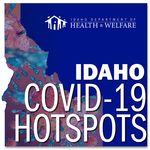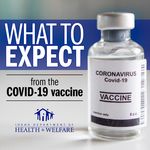NEW COVID-19 VACCINATION INFORMATION WEB PAGE - Idaho.gov
←
→
Page content transcription
If your browser does not render page correctly, please read the page content below
Jan. 29, 2021
Welcome to the Department of Health and Welfare’s bi-weekly
briefing on the department’s latest news, communications activities,
and resources for the pandemic. New in this edition of the briefing is the
new COVID-19 vaccination information page, the latest vaccination timeline,
updated priority groups for the vaccine, information on a new grant aimed at
speeding up the vaccination process, and more.
NEW COVID-19 VACCINATION INFORMATION WEB PAGE
Idaho launched a new COVID-19 vaccination information web page to help Idahoans find information on
when and where to get vaccinated and what to expect when they get to their appointment.
Local public health districts are responsible for implementing vaccination plans, and enrolled COVID-19
vaccine provider information is on each public health district website, but the new resource offers just one
place where all Idahoans can find out when they are eligible to receive the vaccine and where to access
enrolled COVID-19 vaccine providers in their area. The page also tells Idahoans which priority groups, by
occupation and age, are next in line for the vaccine.
COVID-19 VACCINE
As of Jan. 22, Idaho has received a total of 181,000 doses of COVID-19 vaccine. Moving forward, Idaho is
expected to receive roughly 25,000 doses of vaccine each week.
The following types of workers can get vaccinated right now:
• Healthcare workers
• Long-term care facility residents and staff
• First responders (including law enforcement officers and dispatchers)
• Pre-K-12th grade school teachers and staff
• Child care staff
• Correctional and detention facility staff
Starting Feb. 1, Idahoans 65 years of age and older can get vaccinated. Starting late February to early
March, additional types of frontline critical infrastructure workers can get vaccinated.
Those eligible for the vaccine should contact their employer or local public health district for more
information and to schedule an appointment. Find the vaccine hotlines and websites for your local public
health district. Hotlines are experiencing huge volumes of calls. If you have access to a computer, please
consider accessing information on the health districts’ websites.
See the latest estimated timeline for when Idahoans may get vaccinated.
See information on what to expect at your vaccine appointment.
1COVID-19 STATISTICS
As of Jan. 29, 94,071 people have received at least one dose of vaccine
in Idaho. A total of 20,301 people have received both doses. Vaccine
wastage remains very low in Idaho. To date, just 26 doses have been
wasted.
As of Jan. 29, there have been 161,720 confirmed cases of COVID-19
and a total of 1,721 COVID-19-related deaths in Idaho.
Over the past week, the counties seeing the highest COVID-19 infection
rates in Idaho include Blaine, Teton, and Camas. Those counties have
been seeing 7-day moving average incident rates of 74.5, 71.8, and
51.7 per 100,000 people respectively.
COVID-19 statistics can be found on the COVID-19 Data Dashboard. Case data is now updated Monday
through Saturday at 5 p.m., hospitalization data is updated Monday, Wednesday, and Friday by 5 p.m. and
percent positivity testing data is updated by 5 p.m. MT on Thursdays.
Also on the coronavirus website is the COVID-19 Vaccine Data Dashboard. It includes COVID-19
vaccinations by county and public health district, cumulative doses administered, trend data and more.
Additional data may be added in the future. The dashboard updates every Monday, Wednesday, and Friday.
GOVERNOR’S ACTIONS
On Jan. 28, Gov. Brad Little signed a new executive order to speed up safe vaccine rollout and promote
transparency in vaccine administration. See a press release for more information.
On Jan. 20, Gov. Little announced he is instructing the State Board of Education to revise its high school
athletic plan to allow more spectators at sporting events. See a press release for more information.
On Jan. 19, Gov. Little announced he will increase the number of available Idaho National Guard personnel
from 250 to 400 guardsmen that week to aid in Idaho’s pandemic response.
Gov. Little that day also announced the state of Idaho will offer healthcare providers new grants to more
quickly administer COVID-19 vaccine across the state. The new COVID-19 Vaccine Capacity, Safety, and
Reporting Grants can be used by enrolled vaccine provider organizations to increase staffing to administer
shots, purchase needed equipment and supplies, and improve vaccine access for hard-to-reach and
vulnerable populations. The amount each enrolled healthcare vaccine provider will receive is based on the
number of doses they administer. See a press release for more information.
Idaho remains in modified Stage 2 of the Idaho Rebounds reopening plan. Visit the Idaho Rebounds
website for more information.
DHW WEEKLY MEDIA BRIEFINGS ON COVID-19 VACCINE
DHW has hosted weekly media briefings about COVID-19 vaccine
every Tuesday at 2:30 p.m. since Jan. 5. The remote events have
included updates from Gov. Little and DHW officials, followed by a
question-and answer session with members of the media.
For more information about the briefings see a press release
published by Gov. Little’s office. Recordings of past media
briefings are posted on the coronavirus website.
2DHW SOCIAL MEDIA CAMPAIGNS
Social media campaigns remain focused on the rollout of COVID-19 vaccine
in Idaho. The latest campaign urges Idahoans to not let their guard down
and continue following recommended precautions such as mask wearing
and physical distancing. Posts are also communicating the latest vaccine-
related statistics as well as information on how and where to get vaccinated,
potential vaccine side effects and corrections to vaccine-related myths.
IDAHO COVID-19 VACCINE ADVISORY COMMITTEE (CVAC)
Before and during its most recent meeting on Jan. 22, CVAC voted on several clarifications to Groups 1 and
2 of Idaho’s COVID-19 vaccine rollout. Gov. Little has since approved all of CVAC’s votes, though he asked
the committee at its next meeting to reconsider its vote on adult family members who provide in-home
personal care for adults 65 and older because of the size of that group. CVAC’s latest clarifying votes are as
follows:
• Adult family members who provide in-home personal care for adults 65 and older or for other adults or
children with high-risk conditions were added to Group 1.2.
• Behavioral health workers were added to Group 1.4.
• Mortuary and funeral services personnel were added to Group 2.1.
• Homeless shelter residents were added to Group 2.3.
• Clergy who enter healthcare facilities to provide religious support to patients (giving last rites, for
example) were added to Group 1.
• CVAC voted against including foster parents in Group 2.1.
• CVAC voted against including gas, electric, and water utility workers who respond to emergencies
(broken water mains and downed power lines, for example) in Group 2.1.
• CVAC voted against including non-United States Postal Service package delivery service workers (UPS,
FedEx and Amazon Prime workers, for example) in Group 2.3.
For more information see DHW’s press release following the meeting. CVAC’s next meetings are scheduled
for Feb. 5 and Feb. 19.
DHW COMMUNICATIONS TOOLKIT
DHW’s communications toolkit contains social media tiles, digital posters, and flyers aimed at keeping
Idahoans safe from the spread of COVID-19. New additions to the toolkit include the “it only works if you
wear it” social media tile comparing mask wearing during the pandemic to seatbelts, and informational
videos on COVID-19 vaccine. The videos are in both English and Spanish and cover topics including:
• How COVID-19 vaccines are made (Spanish version)
• How COVID-19 vaccines work (Spanish version)
• Fact versus fiction online (Spanish version)
The materials are for healthcare providers, businesses, and other interested stakeholders, and they can be
branded or adapted for social media campaigns and other forms of outreach. The toolkit will be updated
regularly, so check back for new content.
3COVID-19 VACCINE INFORMATION ONLINE
The COVID-19 vaccine section on the coronavirus website is updated daily. The page includes a
comprehensive COVID-19 FAQ that is updated weekly, information on how to volunteer during the
pandemic, recordings of DHW’s media briefings, and a schedule of meeting dates for the Advisory
Committee on Immunization Practices (ACIP) as well as Idaho’s COVID-19 Vaccine Advisory Committee
(CVAC), among other resources.
There is also a link available with resources for COVID-19 vaccine providers.
SCHOOLS
The summary of COVID-19 cases associated with schools in Idaho at the coronavirus website is published
on Mondays under the “Schools” tab.
LONG-TERM CARE FACILITIES
The summary of COVID-19 cases associated with long-term care facilities in Idaho at the coronavirus
website is published on Fridays under the “Long-Term Care” tab.
BUSTING COVID-19 MYTHS
MYTH: COVID-19 vaccine causes infertility in men and
women.
FACT: There is no scientific evidence to suggest the vaccine
causes infertility. In addition, infertility is not known to
occur from natural COVID-19 infection, further indicating
that immune responses to the virus, whether induced by
infection or a vaccine, are not a cause of infertility.
MYTH: People have died from COVID-19 vaccine.
FACT: No deaths have been attributed to the COVID-19
vaccines to date, but there is an ongoing process of
investigating any reported deaths after vaccination.
According to the Centers for Disease Control and Prevention
(CDC), no one in the United States, who experienced
anaphylaxis, has died after receiving the first dose of Pfizer-
BioNTech COVID-19 vaccine between Dec. 14–23, 2020.
An event following receipt of vaccine does not mean that the
vaccine caused it. There have been reports of death following receipt of vaccine in Norway and Germany
in elderly populations, including those who were terminally ill when vaccinated. Those reports indicate the
deaths were likely from underlying diseases including carcinomas, kidney deficiencies, and Alzheimer’s
disease, and not from the vaccine.
4DHW BLOG
The DHW blog features a new blog twice a week. The most recent blog is a Q&A about scheduling an
appointment for vaccine and what to expect.
COMMUNICATIONS FORUM
DHW’s Office of Communications, in partnership with the Gov. Brad Little’s communications director,
created a forum for communications professionals in state agencies, health districts, healthcare
agencies and facilities, and stakeholders to meet every other Monday to discuss COVID-19-related
communications efforts and strategies. The next meeting is on Feb. 1. If you’d like to join send an email to
communications@dhw.idaho.gov.
5You can also read
























































